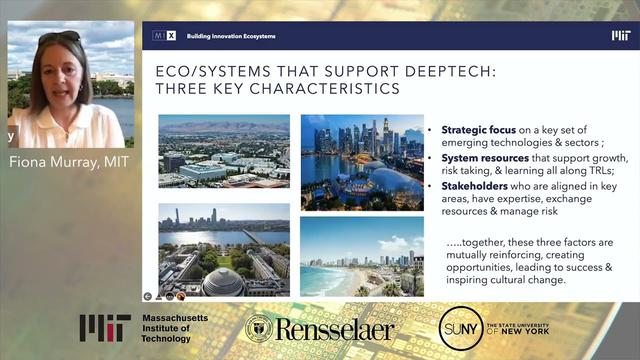A growing gap in the transition of inventions from research labs to market is slowing the development and scale-up of new hardware technologies in the United States. This is particularly evident in complex microelectronics advancements, in which U.S. leadership has lagged. A workshop on semiconductor technology translation and hard-tech startups recently gathered stakeholders from across the country to analyze this challenge and propose solutions.
Presented jointly last month by MIT, the State University of New York (SUNY), and Rensselaer Polytechnic Institute (RPI), the virtual event brought together academic researchers, members of industry, venture capital firms, state and federal agencies, nonprofit organizations, venture accelerators, and startups for a wide-ranging conversation on how to recapture U.S. leadership.

In his opening remarks, MIT Provost Martin Schmidt challenged the speakers and attendees to seize the moment. “We need to think boldly, act decisively, be prepared to reinvent our practices, and not be encumbered by old models of engagement,” said Schmidt, who will assume the presidency of RPI in July. “This workshop will tackle one area that is ripe for work, and that is the process by which we bring the work of academia to have impact through commercialization.”
An audience of 632 individuals joined the 30 invited speakers for a discussion across four sessions: innovation ecosystems, stakeholder perspectives, preparing proto-companies and startups, and startup experiences and shared facilities.“It takes a village to grow a fledgling idea into a prototype that can then become a product that will hopefully reach millions,” said Vladimir Bulović, the Fariborz Maseeh Professor in Emerging Technology, faculty director of MIT.nano, and workshop co-organizer. “Starting and sustaining more hard-tech startups will generate more technology and more new jobs, which will benefit the established industry partners, nurture new industries, and lead to the resurgence of U.S. leadership in microelectronics.”
An environment built for success
What contributes to a thriving innovation ecosystem — and how do we create one for hard-tech? Fiona Murray, the William Porter (1967) Professor of Entrepreneurship and associate dean of innovation and inclusion at the MIT Sloan School of Management, suggested three main characteristics: strategic focus, a system of key resources for founders such as human talent and funding, and stakeholder connectivity — a community purposely built around the priority areas.




